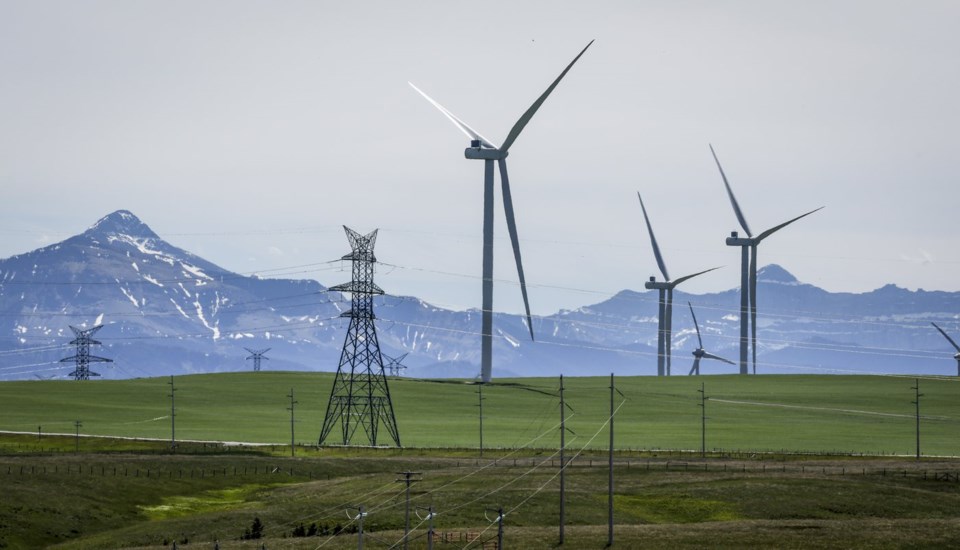EDMONTON — Alberta's seven-month moratorium on renewable power approvals has left a legacy of dozens of cancelled projects and legal uncertainty, says an analysis done on the one-year anniversary of the move.
The clean energy think tank The Pembina Institute says in a report released Friday that 53 wind and solar projects were abandoned after the United Conservative Party government paused approvals for seven months then failed to clarify new rules for those developments.
The capacity of the cancelled projects adds up to more than 8,600 megawatts of generation — more than enough to power every home in Alberta, the report says. Many of those projects would have come with substantial storage capacity.
Another 42 projects have delayed their in-service date by an average of 15 months.
The province — once Canada's hotbed of renewable activity — has seen three new projects come before its system operator since the moratorium was announced Aug. 2, 2023.
"No one that wasn't already in Alberta is looking at Alberta," said Will Noel, one of the report's authors.
Alberta's minister of affordability and utilities called the report "misinformation."
"(The institute's) latest report yet again puts ideology before common sense and intentionally misconstrues the facts," Nathan Neudorf said in a statement.
On Aug. 3, 2023, the province announced no new renewable generation applications would be approved while it considered their effects on agriculture, the environment, municipalities and "pristine viewscapes." That pause came off in February and a new series of draft guidelines on where and how solar and wind projects could proceed was instituted.
Based on information from the Alberta Utilities Commission and the Alberta Electric System Operator, the report says before the moratorium was imposed, there were 118 projects that had notified the system operator of their intention to proceed.
"Looking at the electricity system operator’s project queue is a good reflection of the renewable development interest in Alberta," said co-author Jason Wang in an email. "The first step in any type of electricity project development is to submit project plans and engineering details to the (system operator) before projects seek regulatory approval."
Of those projects, 33 have been cancelled.
The report also says many projects tried to move forward despite the pause by "clustering" their proposals before the system operator in hopes of being grandfathered. Twenty of those have since been cancelled.
Neudorf said basing the report on notices to the system operator distorts its findings. He said before the moratorium, 13 projects had applied to the utilities commission.
"The Pembina Institute is ignoring the reality that not every proposed energy project leads to shovels in the ground," he said.
"What we have in truth is a growing queue for energy projects, not a shrinking one. Alberta continues to be a leader in renewable energy and jurisdiction of choice for investors."
Projects listed by the system operator are often abandoned before they apply for regulatory approval. But the report found cancellations also increased after the moratorium.
In the two full years before the moratorium, an average of 13 per cent of the renewables generating capacity before the system operator was squelched. In the six months before the moratorium, cancellations reached 23 per cent.
That figure skyrocketed after the pause was imposed. Between August 2023 and July 2024, 43 per cent of the generating capacity before the system operator was cancelled.
The report also says none of the guidelines for renewables development have been finalized.
"There's a draft map," said Noel. "It still says draft. There's no official draft."
Final drafts have been promised by the end of the year.
Project proponents have blamed the new rules for at least some of the cancellations. TransAlta CEO John Kousinioris said in May that his company walked away from 300 megawatts of renewable generation because of the restrictions.
Meanwhile, other jurisdictions are moving forward.
Ontario has announced plans for 5,000 megawatts of wind and solar over the next decade. Nova Scotia has committed to getting 80 per cent of its energy from renewable sources by 2030. Hydro-Québec says it will add 10,000 megawatts of new wind capacity to its network by 2035.
In April, BC Hydro called for bids to add about three million megawatt-hours by 2028. That's expected to generate up to $3.6 billion in investment and create up to 1,500 jobs a year.
This report by The Canadian Press was first published Aug. 2, 2024.
Bob Weber, The Canadian Press



